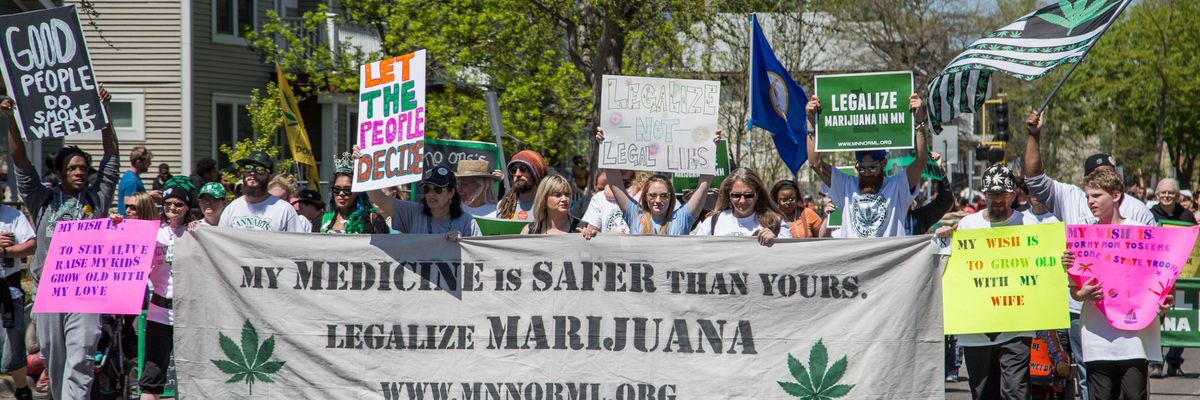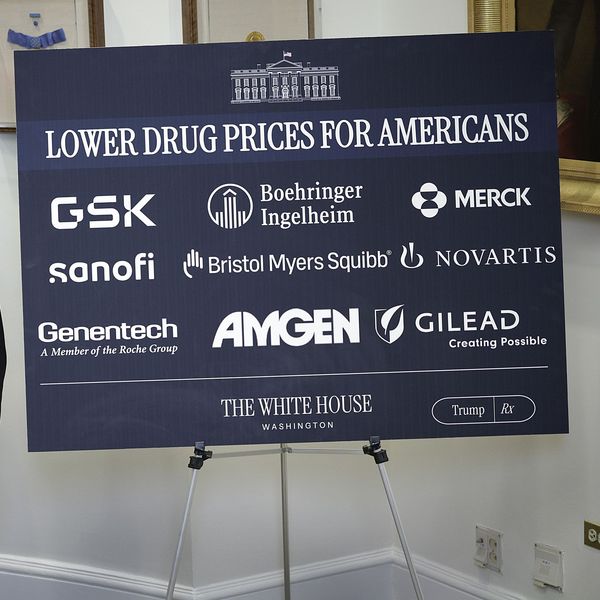
Demonstrators demand marijuana legalization at a May 7, 2017 rally in Minneapolis, Minnesota. (Photo: Tony Webster/Flickr/cc)
Legal Recreational Cannabis Reduces Prescription Drug Demand: Study
The researchers found "significant reductions in the volume of prescriptions within the drug classes that align with the medical indications for pain, depression, anxiety, sleep, psychosis, and seizures."
Legalizing recreational marijuana lowers demand for prescription drugs through state Medicaid programs, according to a new study by researchers in New York and Indiana.
"Our results suggest substitution away from prescription drugs and potential cost savings for state Medicaid programs."
Shyam Raman, a doctoral student at the Cornell Jeb E. Brooks School of Public Policy, and Indiana University doctoral student Ashley Bradford reviewed quarterly data for all Medicaid prescriptions from 2011 to 2019 to analyze the association between recreational cannabis laws and prescription drug use.
In an article published last week in the journal Health Economics, the researchers wrote that "we find significant reductions in the volume of prescriptions within the drug classes that align with the medical indications for pain, depression, anxiety, sleep, psychosis, and seizures."
"Our results suggest substitution away from prescription drugs and potential cost savings for state Medicaid programs," they added.
\u201cLegalization of recreational marijuana reduces demand for costly prescription drugs through state Medicaid programs, according to analysis by a @CornellGrad researcher and an @IndianaUniv collaborator. @CornellBPP @shyamkraman https://t.co/mc2aVuSu6e\u201d— Cornell Chronicle (@Cornell Chronicle) 1650293642
Previous studies have shown reductions in prescription drug use in states with medical marijuana laws. For example, a 2020 paper by researchers at Columbia University's Irving Medical Center revealed a 20% drop in certain opioid prescriptions in states where medical cannabis use was legal compared with states that prohibited it.
However, this is one of the first studies to examine the impact of legal recreational marijuana on a wide range of prescription medications, according to Cornell Chronicle.
"These results have important implications," Raman told the paper. "The reductions in drug utilization that we find could lead to significant cost savings for state Medicaid programs. The results also indicate an opportunity to reduce the harm that can come with the dangerous side effects associated with some prescription drugs."
Related Content

'We Did It': House Passes Bill to Decriminalize Marijuana, Expunge Convictions
According to the National Conference of State Legislatures, marijuana is legal for adult recreational use in 18 states plus the District of Columbia, while 37 states have legalized medical cannabis. On April 1, the U.S. House of Representatives voted to decriminalize the plant nationwide and expunge federal cannabis convictions and arrests. However, the measure faces an uphill battle in the Senate.
An Urgent Message From Our Co-Founder
Dear Common Dreams reader, The U.S. is on a fast track to authoritarianism like nothing I've ever seen. Meanwhile, corporate news outlets are utterly capitulating to Trump, twisting their coverage to avoid drawing his ire while lining up to stuff cash in his pockets. That's why I believe that Common Dreams is doing the best and most consequential reporting that we've ever done. Our small but mighty team is a progressive reporting powerhouse, covering the news every day that the corporate media never will. Our mission has always been simple: To inform. To inspire. And to ignite change for the common good. Now here's the key piece that I want all our readers to understand: None of this would be possible without your financial support. That's not just some fundraising cliche. It's the absolute and literal truth. We don't accept corporate advertising and never will. We don't have a paywall because we don't think people should be blocked from critical news based on their ability to pay. Everything we do is funded by the donations of readers like you. Will you donate now to help power the nonprofit, independent reporting of Common Dreams? Thank you for being a vital member of our community. Together, we can keep independent journalism alive when it’s needed most. - Craig Brown, Co-founder |
Legalizing recreational marijuana lowers demand for prescription drugs through state Medicaid programs, according to a new study by researchers in New York and Indiana.
"Our results suggest substitution away from prescription drugs and potential cost savings for state Medicaid programs."
Shyam Raman, a doctoral student at the Cornell Jeb E. Brooks School of Public Policy, and Indiana University doctoral student Ashley Bradford reviewed quarterly data for all Medicaid prescriptions from 2011 to 2019 to analyze the association between recreational cannabis laws and prescription drug use.
In an article published last week in the journal Health Economics, the researchers wrote that "we find significant reductions in the volume of prescriptions within the drug classes that align with the medical indications for pain, depression, anxiety, sleep, psychosis, and seizures."
"Our results suggest substitution away from prescription drugs and potential cost savings for state Medicaid programs," they added.
\u201cLegalization of recreational marijuana reduces demand for costly prescription drugs through state Medicaid programs, according to analysis by a @CornellGrad researcher and an @IndianaUniv collaborator. @CornellBPP @shyamkraman https://t.co/mc2aVuSu6e\u201d— Cornell Chronicle (@Cornell Chronicle) 1650293642
Previous studies have shown reductions in prescription drug use in states with medical marijuana laws. For example, a 2020 paper by researchers at Columbia University's Irving Medical Center revealed a 20% drop in certain opioid prescriptions in states where medical cannabis use was legal compared with states that prohibited it.
However, this is one of the first studies to examine the impact of legal recreational marijuana on a wide range of prescription medications, according to Cornell Chronicle.
"These results have important implications," Raman told the paper. "The reductions in drug utilization that we find could lead to significant cost savings for state Medicaid programs. The results also indicate an opportunity to reduce the harm that can come with the dangerous side effects associated with some prescription drugs."
Related Content

'We Did It': House Passes Bill to Decriminalize Marijuana, Expunge Convictions
According to the National Conference of State Legislatures, marijuana is legal for adult recreational use in 18 states plus the District of Columbia, while 37 states have legalized medical cannabis. On April 1, the U.S. House of Representatives voted to decriminalize the plant nationwide and expunge federal cannabis convictions and arrests. However, the measure faces an uphill battle in the Senate.
Legalizing recreational marijuana lowers demand for prescription drugs through state Medicaid programs, according to a new study by researchers in New York and Indiana.
"Our results suggest substitution away from prescription drugs and potential cost savings for state Medicaid programs."
Shyam Raman, a doctoral student at the Cornell Jeb E. Brooks School of Public Policy, and Indiana University doctoral student Ashley Bradford reviewed quarterly data for all Medicaid prescriptions from 2011 to 2019 to analyze the association between recreational cannabis laws and prescription drug use.
In an article published last week in the journal Health Economics, the researchers wrote that "we find significant reductions in the volume of prescriptions within the drug classes that align with the medical indications for pain, depression, anxiety, sleep, psychosis, and seizures."
"Our results suggest substitution away from prescription drugs and potential cost savings for state Medicaid programs," they added.
\u201cLegalization of recreational marijuana reduces demand for costly prescription drugs through state Medicaid programs, according to analysis by a @CornellGrad researcher and an @IndianaUniv collaborator. @CornellBPP @shyamkraman https://t.co/mc2aVuSu6e\u201d— Cornell Chronicle (@Cornell Chronicle) 1650293642
Previous studies have shown reductions in prescription drug use in states with medical marijuana laws. For example, a 2020 paper by researchers at Columbia University's Irving Medical Center revealed a 20% drop in certain opioid prescriptions in states where medical cannabis use was legal compared with states that prohibited it.
However, this is one of the first studies to examine the impact of legal recreational marijuana on a wide range of prescription medications, according to Cornell Chronicle.
"These results have important implications," Raman told the paper. "The reductions in drug utilization that we find could lead to significant cost savings for state Medicaid programs. The results also indicate an opportunity to reduce the harm that can come with the dangerous side effects associated with some prescription drugs."
Related Content

'We Did It': House Passes Bill to Decriminalize Marijuana, Expunge Convictions
According to the National Conference of State Legislatures, marijuana is legal for adult recreational use in 18 states plus the District of Columbia, while 37 states have legalized medical cannabis. On April 1, the U.S. House of Representatives voted to decriminalize the plant nationwide and expunge federal cannabis convictions and arrests. However, the measure faces an uphill battle in the Senate.

